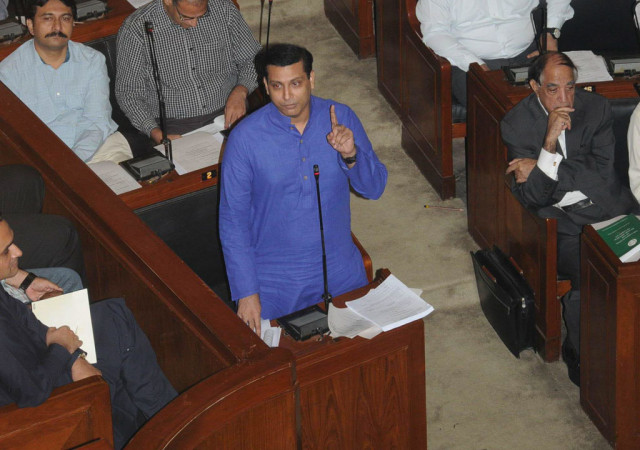Majority rules: Sindh Assembly passes local government bill
MQM, PPP at loggerheads over dissemination, consultation.

"The government is going to pass a law putting all the province’s affairs under the bureaucracy," says Sindh Assembly’s leader of the opposition Faisal Subzwari. PHOTO: RASHID AJMERI
The Sindh Assembly finally passed the Sindh Local Government Bill 2013 with a majority of votes on Monday, despite opposition from the Muttahida Qaumi Movement (MQM).
Soon after Provincial Law Minister Dr Sikandar Mandhro moved the bill, MQM members stood up and asked the Assembly Speaker, Agha Siraj Durrani, about copies of the bill, which were not provided to a majority of the MPAs.
This triggered an altercation among members of both the former coalition partners. “Only a few members have been given copies of this bill, which is full of mistakes and lacks the aims-and-objectives portion. This bill is against the rules and we request you to please reconsider your decision and refer it to any special committee for debate and modification,” said Syed Sardar Ahmed, the MQM parliamentary leader.
Other opposition parties including Pakistan Muslim League-Nawaz (PML-N) and Pakistan Muslim League-Functional (PML-F) supported the government’s bill, while the members of Pakistan Tehreek-e-Insaf (PTI) took a neutral stance – they neither raised their hands in favour nor opposed the legislation.
“Please do not misguide the people and indulge in the politics of blame game,” said Senior Minister for Education Nisar Ahmed Khuhro, who is a member of the ruling Pakistan Peoples Party (PPP). Waving the copy of the bill, he said, “The copies have been provided to all the members. It seems like the members of your party are making a fuss!”

The house echoed with the slogans of “shame, shame” and MQM members continued berating the bill, calling it General Zia’s legacy.
Khuhro, while defending his party, said, “I acknowledge that the law has been made in view of the 1979 system. But one should keep in mind that the provincial government has actually followed the idea of Zulfikar Ali Bhutto who had initially made the local bodies law in 1972 that suggested having one metropolitan corporation in Karachi.”
He read out the aims and objectives of the bill, which reads: “The law is expedient to establish an elected government system to devolve the political, administrative and financial authority to the elected representatives to promote good governance.”
However, Sindh Assembly’s leader of the opposition Faisal Subzwari disagreed. “Article 140A of the constitution talks about autonomy of the local bodies, but the government is going to pass a law putting all the province’s affairs under the bureaucracy,” he said, adding that this system will divide rural and urban Sindh.
Members of the PPP and the MQM were not willing to hear each other’s arguments, which forced PML-N leader Irfanullah Marwat to intervene. Marwat, while supporting the bill, said, “Our party considers the PPP an archrival, but we will support the good things they introduce.” PML-F leader Imtiaz Shaikh also seconded Marwat’s statement, but suggested that PPP should not be in a hurry in making the law and take all the stakeholders into confidence.
PTI member Syed Hafeezuddin expressed his concern over not taking his party into confidence. “No party, including the PPP and the MQM is concerned about the development of this province. The bill is being passed only in compliance with Supreme Court’s order,” he said.
Nevertheless, the bill was passed with a majority of the votes.
Published in The Express Tribune, August 20th, 2013.



















COMMENTS
Comments are moderated and generally will be posted if they are on-topic and not abusive.
For more information, please see our Comments FAQ